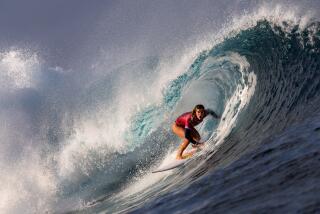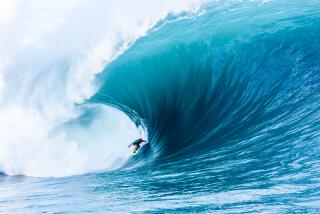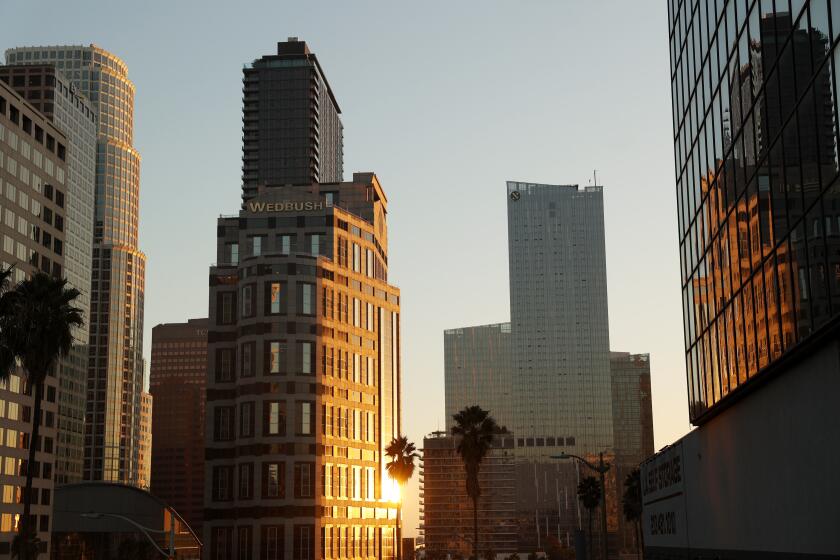New Wave in Board-Building Goes to the Soul of Surfing
Hermosa Beach surfboard manufacturer and retailer Dave Hollander, owner of the Becker brand, recalls the day his board-making crew went on a scouting mission to inspect the latest competition--an import from Taiwan.
“They called me from the Costco and said, ‘Oh my God, you won’t believe it,’ ” says Hollander, whose crew described the board as a reasonably good product.
Costco. Of course.
Discount pork chops. Jumbo-size toothpaste. And now, just when you thought it was safe to go back in the water, cheap Costco surfboards.
The Realm, as it’s called, sells for $244.99, and it has been the hot topic in the surfing community all summer. A comparable, entry-level board, produced locally, sells for at least $100 more.
“There’s a raging debate,” says Steve Pezman, publisher of the Surfer’s Journal.
As there should be. Globalization has gone too far when a cheap knockoff threatens the artisans and layabouts who carved their initials in a chapter of American culture.
Mark Richards, of Val Surf shops in the San Fernando Valley, says it’s tough to compete with “dollar-a-day labor.” And surfboards are the least of his worries. Richards says the big money is in surf apparel and accessories, not boards, and Costco is already competing there too.
Some board makers and surf shop owners are gleefully sharing stories of broken boards being lugged back to Costco for refunds. “I’ve got two confirmed reports now from industry sources,” Hollander says.
The obvious fear among independent board makers and retailers is that Costco, advancing on coastal terrain like an insatiable, big-footed beast out to rule the world, will crush a cottage industry in which the art of board-making is handed down like a family secret.
A board made overseas, by a nonsurfer, “has no soul in it,” says board maker Todd Roberts of ZJ Boarding House in Santa Monica. “It’s something we’ve kept in the family, and somebody sold us out.”
Some of those same passions have worked their way into the controversy over another import--a molded board manufactured in Thailand using a new technology. If a board is not made by hand in Southern California, some of the high priests of surfing claim, it’s not worth having.
But others, including Dave Hollander, who sent his crew on that spying mission at Costco, have mixed feelings. If the discount chain helps popularize the sport, Hollander says, everyone in the business could benefit.
The surfer who gets hooked on the sport with a Costco board, and then wants to graduate to better boards and gear, is going to end up at a bona fide surf shop, says Hollander, who owns several in L.A. and Orange counties.
“I know this is blasphemy, and I’m really putting my neck out there because this is such a hot issue right now,” Hollander says. “But I’m really just being honest.”
Honest enough to also confess that he, too, thought about working a deal to have cheap boards manufactured in Taiwan. Costco just beat him to it.
“I can’t tell you how many people come into our Hermosa Beach shop every Saturday and want to buy a good board they can learn on for $250,” Hollander says. “And do you know how many of those boards I have? None.”
Costco, which could sell ice in Alaska, saw an opening and bored in. They’ve got to be watched, Hollander says, because if they attempt to devour the industry, they’ll crush tradition and romance in the process. But he’s kicking himself for not beating them to the entry-level market.
So just how serious is Costco about surfing?
Hard to say.
“I imagine surfing will be just a seasonal item for them,” says Sean O’Brien of TransWorld SURF Business, a trade magazine.
O’Brien says Costco sold surfboards last summer, too, for $199, but they were inferior models that hadn’t been special-ordered. This time around, he says, Costco got serious and contracted with a Taiwanese company that sells boards in Asia.
I called Costco headquarters in Issaquah, Wash., and was told there is no communications department.
“The only one who talks to the press is the CEO,” said a receptionist who transferred me to Jim Sinegal’s office, where a secretary took my name and number.
Well, does the Big Kahuna return calls, I wondered?
“Sometimes,” she said.
It was easier getting information out of the Kremlin, which affirms my suspicion about Costco’s true aim: one world, one store.
*
Steve Lopez writes Sunday, Wednesday and Friday. Reach him at [email protected]
More to Read
Inside the business of entertainment
The Wide Shot brings you news, analysis and insights on everything from streaming wars to production — and what it all means for the future.
You may occasionally receive promotional content from the Los Angeles Times.











